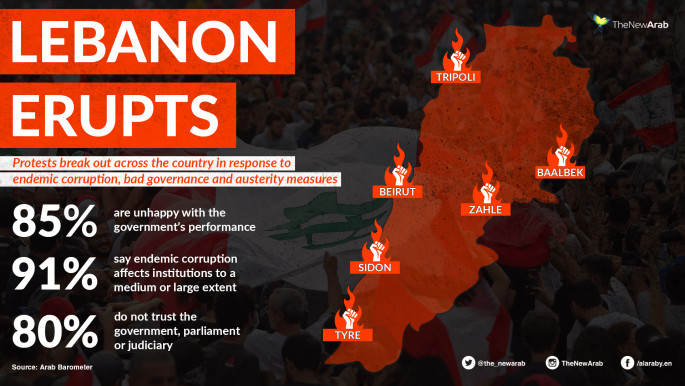Lebanon's diaspora takes anti-government protest movement global
Demonstrations took place on Sunday in Paris, Sydney, Brussels and Lagos, as well as Mexico City and US cities Tampa, Florida.
Crowds waved Lebanese flags and chanted anti-government slogans.
From Lagos, one of the protesters told The New Arab that the crowd gathered outside the embassy, undeterred by the weather.
"Despite the heavy rain, dozens of us gathered at the doors of the consulate to demand an end to government corruption and to show our support to this movement," Ali Khalil told The New Arab.
On Saturday in several US cities including Washington DC, New York, Los Angeles and San Francisco.
Lebanese expats also rallied Montreal, London and Madrid on Saturday.
One of London protest's organisers told The New Arab he was proud to have been part of this movement albeit from afar.
"We estimated around 200 people would turn up to the rally, but there were more than 2,500 people gathered outside the embassy," Toufic Braidi told The New Arab.
There are millions of Lebanese living abroad, many of whom have fled the country during the civil war period and after, in search for better opportunities.
"I left my country because there was no hope for Lebanon, but today from London my heart breaks for my nation, I am saddened that I am unable to join the protests in Lebanon to demand my rights," Braidi, who is also a social media personality, told The New Arab.
"So I really wanted to do something from here, from London, because enough if enough! We as Lebanese, cannot bear the corruption anymore!" he said.
"As expats, we want to return to a country that has hope. We want to return to a strong and united Lebanon. This is our hope," he added.
Many were chanting "revolution" or "the people demand the fall of the regime" - a common slogan of demonstrations in other parts of the Arab world.
Demonstrations in Lebanon began spontaneously on Thursday in response to a proposed tax on calls via WhatsApp and other messaging services.
While the government quickly dropped the plans, the protests morphed into demands for a sweeping overhaul of Lebanon's political system, with grievances ranging from austerity measures to poor infrastructure.
More than a quarter of Lebanon's population lives below the poverty line, according to the World Bank, while the country's political class has remained relatively unchanged since the end of a devastating 15-year civil war in 1990.





 Follow the Middle East's top stories in English at The New Arab on Google News
Follow the Middle East's top stories in English at The New Arab on Google News


